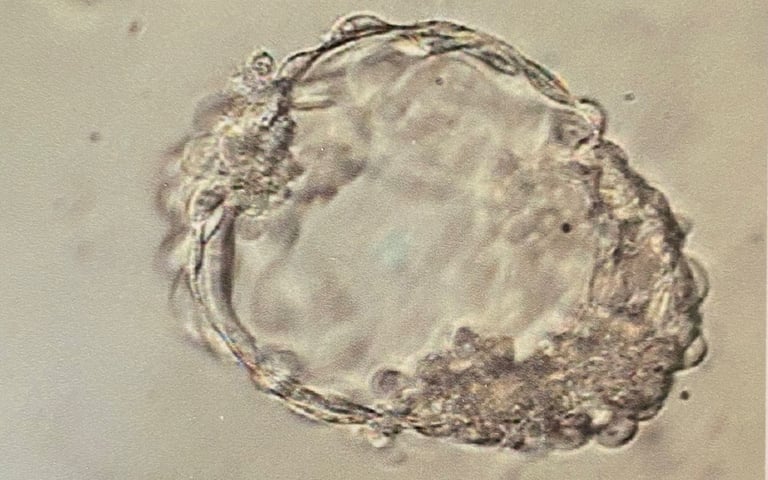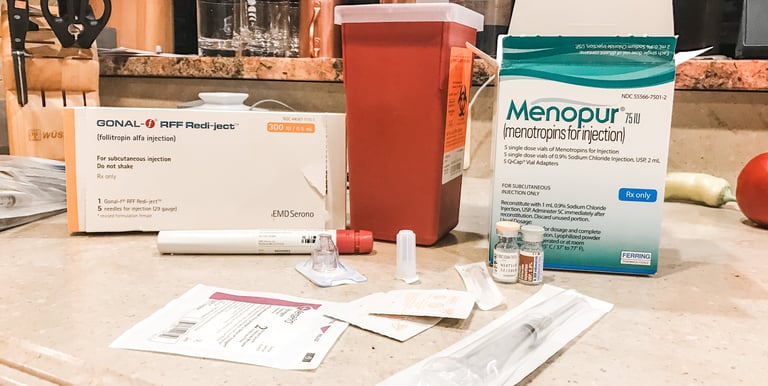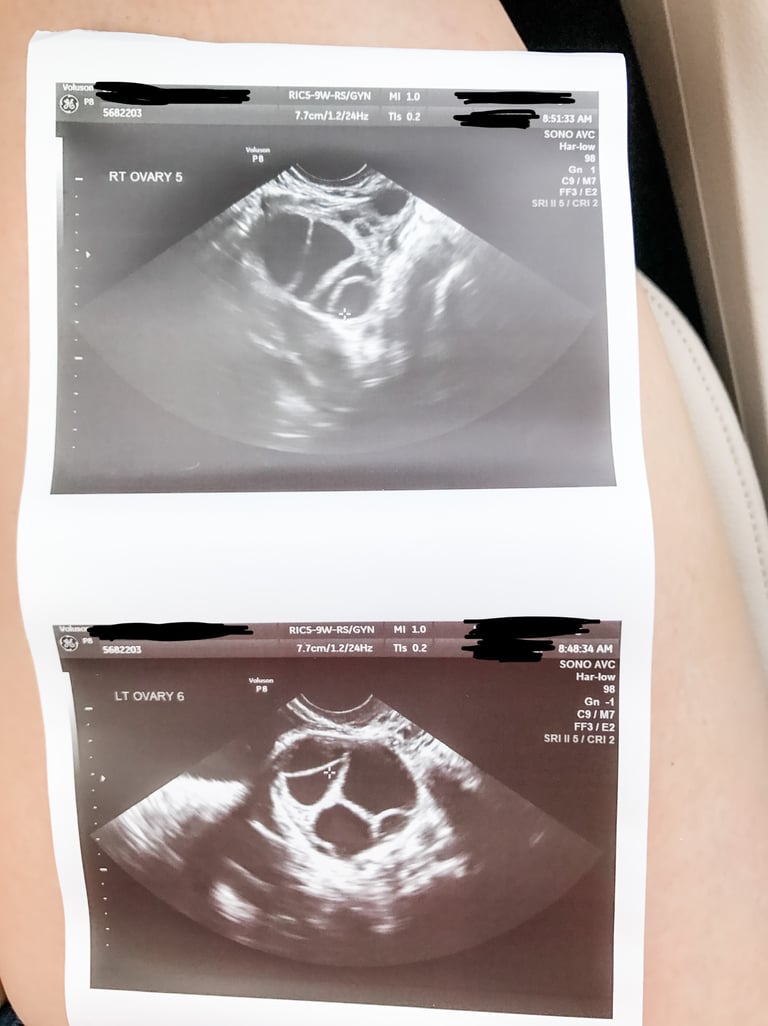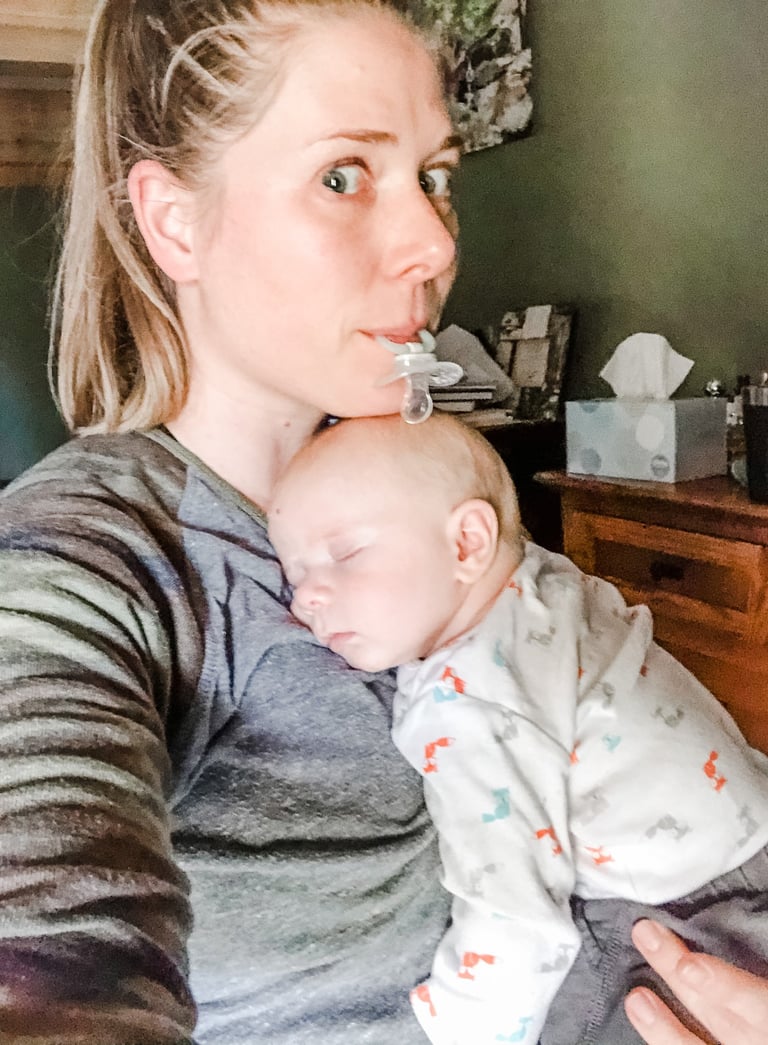Navigating the Rollercoaster of Infertility: A Woman's Tale of Hope, Heartbreak, and Parenthood
Wanting to have babies and not being able to without a lot of science…and sometimes that isn’t even enough
Becca Smith
9/23/20238 min read


In a world where the journey to parenthood is often portrayed as a seamless and joyous path, the reality for many women can be vastly different. Infertility is a silent struggle that affects millions of couples worldwide. This blog post explores the emotional rollercoaster that a woman goes through, from the initial testing to the hopeful ultimate triumph of parenthood, with all the heartache, anxiety, and conflicting emotions in between. It's a story of resilience and empathy for all those who have faced or are facing the trials of infertility.
The journey through infertility begins with that sinking feeling when month after month, the pregnancy tests continue to show a disheartening negative. Each month becomes a painful reminder of the elusive dream of parenthood. For many women, this is the start of an emotional whirlwind, as they watch friends and family members announce pregnancies and attend an endless string of baby showers. The agony of not being able to conceive while seemingly everyone around you can feels isolating and overwhelming.
I remember one instance vividly. I was at a baby shower for my friend and was in the middle of IUI (intrauterine insemination) cycles. I got a phone call from my fertility clinic and it was to inform me that my pregnancy test was negative, the most recent round didn’t work. I was devastated. I left the crowd of women oohhhing and ahhhing over baby clothes and toys to go outside and cry and call my husband. After that, no more baby showers for me. I politely told my friends I was happy for them, RSVP’ed “no” to the invite, and sent gifts. I just couldn’t do it emotionally anymore.


In the quest to unravel the mystery behind infertility, countless medical tests and examinations often follow. From blood work and ultrasounds to invasive procedures, this phase is emotionally and physically taxing. Yet, it's a necessary step towards hopefully uncovering the root cause of infertility. For some, the solution may be relatively straightforward, such as hormone therapy or lifestyle changes. For others, the journey takes a more complicated turn. I still never got a clear diagnosis, “ovulatory dysfunction NOS” (not otherwise specified).
Whether or not a couple or and individual wants to have kids is a very personal decision. Unfortunately, it is becoming all too common that many struggle with infertility. When my husband and I decided to have kids we definitely didn’t think that we would fall into that category but nevertheless, there we found ourselves. I was suddenly on the opposite end of the doctor patient relationship and I, along with my husband, were getting lots of tests done and going to tons of appointments.
Testing and Treatment


I remember starting this process and thinking it will be no time at all until we’re pregnant, even with all my knowledge and training as a doctor I didn’t really know what we were getting into. We quickly realized how long this process takes and how much is involved. I would see a constant revolving door of women at my fertility clinic, coming and going for appointments and testing. I had no idea how many other women struggled with this.
My insurance at the time had an allotment of $10,000 to spend on fertility treatments and anyone who has been through this knows that is nothing, not a drop in the bucket when it comes to what this process costs. I quickly maxed that out just on the medications and hormones needed and we had to find the money to proceed further. I was still a pretty new attending physician and we had a lot of debt to contend with, the cash wasn’t exactly flowing. Luckily we were able to get a no interest loan from my parents to persue the IVF we untilately needed which we paid back over the next year. We have been really lucky to have such supportive family through all of this.
Intrauterine insemination (IUI) and in vitro fertilization (IVF) are common next steps for many couples struggling with infertility. These procedures offer hope but also bring their own set of challenges. The anticipation of whether each attempt will finally bring the long-awaited positive pregnancy test is both thrilling and terrifying. The emotional toll of failed IUIs and IVF cycles can be excruciating, leaving couples in a constant state of uncertainty.
IUI and IVF: The Hopeful Milestones
We went down the road of IVF with the daily shots, strict schedule, endless appointments, and inevitable diasappointments. For anyone who hasn’t done IVF a typical cycle takes about 3 months. That’s to take the injections, induce lots of follicle (egg) development, and let them grow to the optimal size before retrieval. When they retrieve the eggs depends on measurements on ultrasound so you go in every day for at least a week leading up to the retrieval to determine when the retrieval will happen. For us, this all happened the week before my sister’s wedding. My retrieval kept getting pushed back and ended up being the day before her wedding. We had to miss the rehearsal but fortunately it wasn’t pushed to the next day and we didn’t miss any of the wedding day festivities. I also am fortunate to have a very understanding sister who wasn’t upset by any of this.


The attrition rate of eggs after they are retrieved is pretty high, meaning even if you get a lot of eggs you aren’t likely to get a lot of viable embryos. We had 10 eggs retrieved, 5 fertilized, 3 matured, and only 1 was viable for a transfer. We had preconception genetic testing so we knew he was a boy and had no chromosomal abnormalities even before the embryo transfer was attempted. Then came the waiting.
The longest 2 weeks ever! I was a traveling physician at this time working night shifts in Virginia over the Thanksgiving holiday and had to get my blood drawn Thanksgiving morning. One of the benefits of working in a hospital is that I gave my bloodwork order to my charge nurse and she had the phlebotomist come draw my labs. I sat next to one of the nurses in the ER as she looked up my result for me and turned the monitor to show me my positive result. I was elated, I called my husband immediately (waking him from his sound slumber but he managed to sound excited despite me jolting him awake). My dad’s side of the family was at my grandmother’s house in Charlottesville, VA so I called to tell them and he happily announced it to all of them, the cheering ensued! It was such a relief and felt like such a huge milestone.


I was lucky to have a healthy uneventful pregnancy. The getting pregnant part was what we needed help with but the staying pregnant part proved to be no problem for me. In fact, he was so happy in there I went almost 1 week overdue, had to be induced, and then had a 49 hour labor before he finally decided to make an appearance.
When the moment finally arrives, and that positive pregnancy test appears, joy and relief flood in. But, for many, the excitement is quickly accompanied by a new set of anxieties. The fear of miscarriage or complications during pregnancy can be overwhelming. Each milestone, from the first ultrasound to the baby's first kicks, is met with cautious optimism and, often, sleepless nights filled with worry. It took so much time, effort, and science to get pregnant. It seems like it can all just disappear as quickly as it finally came.
That being said I wasn’t going to let it completely rule and control my life. I still did CrossFit and lifted weights, my doctor was on board with this and I paid close attention to how I felt throughout. It was quite humbling to continue those workouts as I got more and more pregnant and I was proud of everything my body was capable of.
The Anxiety of a Fragile Dream


Through this rollercoaster journey, women who have battled infertility develop a deep sense of empathy. They understand the silent struggles of others who are still on the path, and they carry a unique appreciation for the gift of parenthood. It's crucial to reach out, share experiences, and offer support to those who continue to face infertility, as well as those who may never achieve their dream of becoming parents.
The birth of a baby is a momentous occasion, but it doesn't always come with the expected wave of bliss. Sleepless nights, colic, and the overwhelming demands of caring for a newborn can create a storm of conflicting emotions. Many women find themselves oscillating between exhaustion and gratitude. I remember thinking, “I wanted this, I paid a lot of money to have this, I should be grateful.” And I was but I was also exhausted, overwhelmed, and feeling guilty for having these emotions when we wanted this so badly and tried so hard for so long to have this exact life.
Over time, I learned that two things can be true. I can be grateful to have a baby but also overwhelmed and need a break. I can look at him and feel an incomparable feeling of joy and also long for time for myself without a little creature dangling from my boob. This isn’t wrong, it’s just life, and no one should feel guilty for having these emotions.
Conflicting Emotions of Parenthood
Empathy for Others
Infertility is a tumultuous journey filled with highs and lows, hopes and heartbreaks. It's a journey that many women embark on, often with little external understanding of the emotional turmoil they endure. This blog post aimed to shed light on the emotional complexities of infertility, from the initial testing to the joy of parenthood and the ongoing empathy for those who continue to struggle. Remember that you are not alone in this journey, and there is hope, even in the darkest of moments
I truly hope that this post reaches other women who are struggling with this and if you get nothing else from this I want you to know that you are not alone! It feels like the loneliest most isolating journey but you are not taking it solo. I wish I had reached out to other women earlier in my process. There are so many places you can reach someone. My door is open, message me, I'd love to chat with you. Your clinic likely also has resources on communities, forums, and support groups. Check online for these things near you. Social media has tons of options to connect as well.
